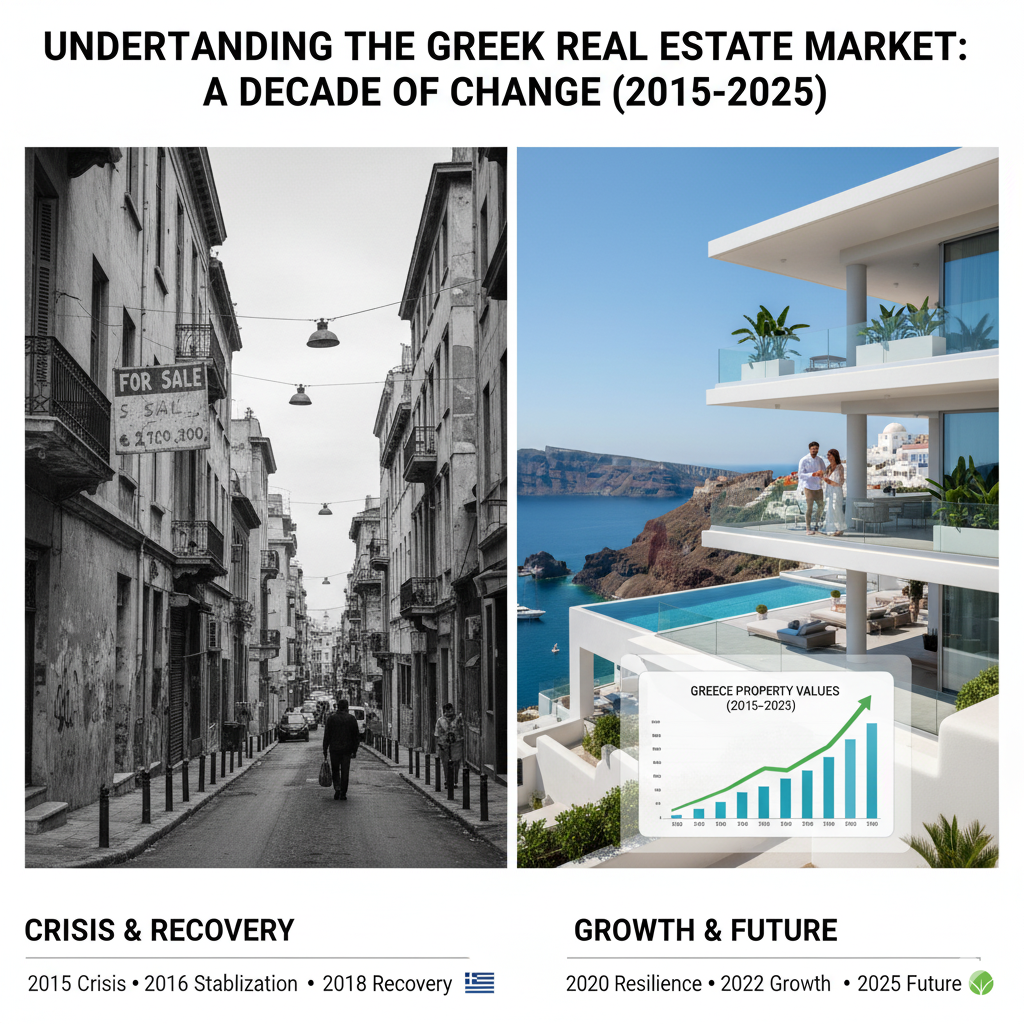The Greek Real Estate Market: A Deep Dive into a Decade of Transformation (2015-2025)
The Greek real estate market's trajectory from 2015 to 2025 is a compelling narrative of crisis, resilience, strategic recovery, and evolving opportunity. This period encapsulates a profound shift from an ailing sector, deeply mired in the nation's sovereign debt crisis, to a burgeoning hub of international investment and domestic renewal.
Phase 1: The Nadir and Nascent Recovery (2015-2018)
The Context of Crisis (2015):
Entering 2015, Greece was at a critical juncture, navigating the final, painful stages of its bailout programs. The real estate market mirrored the broader economic despair:
Property Value Depreciation: Residential and commercial property values had plummeted by an average of 40-50% from their pre-crisis peaks (2007-2008), with some areas experiencing even steeper declines.
Stagnant Transactions: Sales volumes were minimal, reflecting a severe lack of confidence among both domestic and international buyers. The domestic market was squeezed by high unemployment, shrinking disposable incomes, and restricted credit access.
Banking Sector Woes: Greek banks were heavily burdened by an enormous volume of Non-Performing Loans (NPLs), many of which were collateralized by devalued real estate. This severely limited their capacity to provide new mortgage lending, effectively freezing domestic demand.
Limited Development: New construction virtually ceased, leading to an aging housing stock and a lack of modern, energy-efficient properties.
Turning the Tide - Early Signals of Change (2016-2018):
Despite the lingering challenges, the seeds of recovery were strategically planted and began to germinate:
Economic Stabilization: Gradual improvements in macroeconomic indicators, culminating in Greece exiting its third bailout program in August 2018, slowly restored a fragile sense of stability.
The Golden Visa Program Takes Hold: Launched in 2013, the Greece Golden Visa Program truly began to gain traction in this period. Offering a five-year renewable residency permit in exchange for a minimum real estate investment of €250,000 (one of the lowest thresholds in Europe), it became a lifeline. Investors, primarily from China, Russia, Turkey, and the Middle East, were drawn by the attractive price points and the promise of Schengen area access. This program was instrumental in injecting much-needed foreign capital, particularly into Athens, Thessaloniki, and popular islands.
Tourism as a Driver: Greece's perennial appeal as a tourist destination continued, and with the rise of platforms like Airbnb, a new market for short-term rental investments emerged. Investors saw an opportunity to generate rental income from properties in high-demand tourist areas, offsetting the depreciation risks.
Property Price Stabilization: Towards the latter half of this period, property price declines began to slow, and in some prime urban and tourist areas, modest increases were observed, signaling a bottoming out of the market.
Phase 2: Accelerated Growth and Diversification (2019-2022)
This phase marked a robust rebound, driven by strengthened fundamentals and growing international confidence.
A Market on the Rise (2019):
Strong Economic Momentum: Greece's economy was experiencing its best performance in years, with positive GDP growth, declining unemployment, and a more stable political landscape following the 2019 elections. This fostered both domestic and international confidence.
Surging Property Values: Property price indices showed significant year-on-year increases, moving beyond stabilization to sustained growth. Athens and the Cycladic islands led the charge, with price gains exceeding 10% annually in some micro-markets.
Increased Transaction Volumes: Sales transactions soared, indicating renewed investor appetite and easier access to financing as banks began to clean up their balance sheets.
Hospitality Sector Boom: Beyond short-term rentals, significant investments flowed into hotel acquisitions, renovations, and new developments, particularly in luxury and boutique segments, catering to Greece's booming tourism.
Institutional Investment: Larger institutional investors and private equity firms started to re-enter the market, targeting distressed assets, large-scale developments, and income-generating commercial properties.
Navigating the Pandemic (2020-2021):
Initial Shock and Resilience: The COVID-19 pandemic caused an initial shock in early 2020, leading to a temporary slowdown in transactions, especially from overseas buyers due to travel restrictions. However, the market displayed remarkable resilience. Unlike previous crises, property values generally held firm or continued their upward trend, albeit at a slower pace in some areas.
Shift in Preferences: The pandemic also influenced buyer preferences, with increased demand for larger homes, properties with outdoor spaces (gardens, balconies), and a growing interest in secondary cities and rural areas as remote work became more prevalent.
Digitalization Acceleration: The crisis spurred a faster adoption of digital tools for property viewings, transactions, and legal processes, making the market more accessible to international buyers.
Sustained Growth (2022):
Strong Rebound Post-Pandemic: As global travel resumed, the Greek real estate market experienced a strong rebound. The tourism sector roared back, further fueling demand for rental and investment properties.
Golden Visa Remains Strong: Despite global uncertainties, the Golden Visa program continued to attract substantial interest, adapting to new geopolitical realities.
Inflationary Pressures: Global inflation began to emerge as a significant factor, with real estate often seen as a hedge against rising prices, further driving investment.
Phase 3: Maturation, Sustainability, and Strategic Evolution (2023-2025)
The coming years are expected to see the Greek real estate market mature, with a focus on sustainable development, diversification, and adapting to new regulations and global trends.
Key Trends and Expectations:
Moderated Price Growth: While price increases are expected to continue, the pace might moderate compared to the rapid gains of 2019-2022, settling into a more sustainable growth trajectory.
Evolution of the Golden Visa: The Golden Visa program is likely to undergo adjustments. Discussions about increasing the minimum investment threshold (e.g., to €500,000 in certain prime areas, already implemented for specific regions) aim to shift investment towards larger projects or less saturated regions, and to align with evolving EU policies. This will reshape the investor profile and target properties.
Focus on ESG and Sustainability: Environmental, Social, and Governance (ESG) factors will become paramount. New developments and renovations will increasingly prioritize energy efficiency, green building materials, and sustainable urban planning, driven by EU directives and growing investor demand for responsible investments.
Infrastructure-Led Development: Continued government investment in infrastructure (e.g., upgrades to Athens' metro, regional airport enhancements, port expansions like Piraeus and Thessaloniki) will unlock new development zones and increase the value of properties in previously underserved areas.
Diversification of Investment: Beyond residential and hospitality, increased interest is anticipated in:
Logistics & Warehousing: Driven by e-commerce growth and Greece's strategic geographical position.
Data Centers: As digitalization accelerates.
Renewable Energy Projects: Land acquisition for solar and wind farms.
Student Housing: Responding to the growing number of international students.
Urban Regeneration Projects: Large-scale projects, such as the Ellinikon project in Athens, will act as significant catalysts, creating new commercial hubs, residential areas, and recreational spaces, attracting both domestic and international attention.
Digital Transformation: Further streamlining of bureaucratic processes, property registration, and transaction management through digital platforms will enhance transparency and efficiency.
Challenges and Opportunities:
Inflation and Interest Rates: The global inflationary environment and rising interest rates could temper demand, particularly for domestic buyers reliant on mortgages.
Labor and Material Costs: Increased construction costs due to rising material prices and labor shortages could impact development margins.
Regulatory Adaptation: Ongoing adjustments to planning laws, property taxation, and rental market regulations will require careful monitoring by investors.
Energy Crisis Impact: The broader European energy crisis could impact operating costs for properties, emphasizing the need for energy-efficient investments.
In essence, the Greek real estate market has undergone a profound metamorphosis. From the ashes of a deep economic crisis, it has emerged as a dynamic and mature investment landscape. The period leading up to 2025 is set to solidify its position as a significant player in the European real estate arena, characterized by strategic growth, sustainability, and an evolving appeal to a diverse range of investors.

